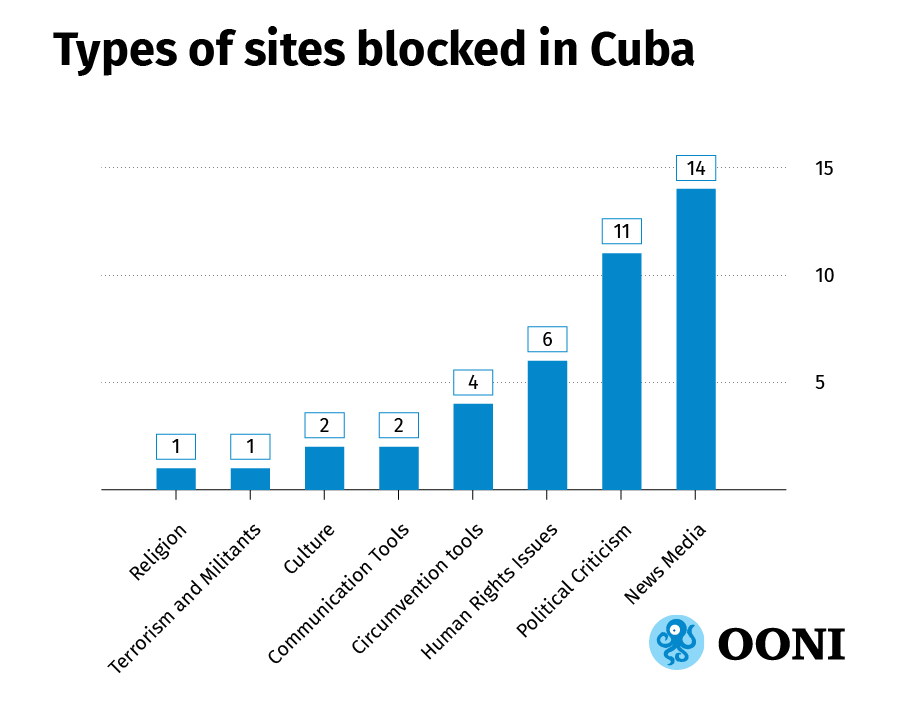Here Are the 41 Websites You Can’t Access in Cuba
Credit to Author: Louise Matsakis| Date: Wed, 30 Aug 2017 22:34:42 +0000
Want to access Skype in Cuba? Without a VPN, you’re out of luck. The service is blocked in the country, along with dozens of other websites, according to new report from the Open Observatory of Network Interference (OONI), which works under the Tor Project. The study, published this week, shows just how censored Cuba’s internet still is.
Researchers from OONI monitored eight different internet access points in three different Cuban cities (Havana, Santiago de Cuba, and Santa Clara) between May 29 and and June 10 of this year. Their findings show that 41 different websites are blocked in the country, including the Cuban Free Press Project and Freedom House, an independent watchdog organization that advocates for greater civil liberties around the world. In total, OONI tested nearly 1,500 different websites in order to see which were restricted.
Most of the sites blocked have criticized the Cuban Castro regime (either directly or indirectly) according to the report. News sites that have published articles critical of the Cuban government made up the bulk of restricted sites.
“Prior to traveling to Cuba, we had heard that sites expressing political criticism had been reported to be blocked,” Simone Basso, Maria Xynou, and Arturo Filastò, the researchers behind the study, told me in an email. “However, it was interesting to collect data showing the scale of sites—expressing criticism and defending human rights—actually blocked.”

Only the HTTP versions of the sites, and not the more secure HTTPS versions, were restricted, “potentially enabling users to circumvent the censorship by merely accessing them over HTTPS,” according to the report.
Skype was the only popular communication platform that was censored; alternatives like Facebook and WhatsApp are used widely throughout the country. OONI also found that a number of tools used for surfing the internet anonymously were blocked, like web proxy Anonymouse.
The government is not the only source of censorship in Cuba. Google, for example, blocks access to its App Engine, a platform for building web and mobile apps, within the country, according to the OONI report. Google likely restricted access because of the United States’ economic embargo on Cuba. “There are a number of restrictions on Google’s ability to offer our full range of platforms and services in every region,” a spokesperson for the company said. “For example, in compliance with US law, a number of services aren’t available within certain countries including Cuba.”
The report also found that Huawei supported the internet infrastructure in Cuba. “The server headers of blocked sites, for example, pointed to Huawei equipment,” the researchers explained. “It remains unclear though whether and to what extent Huawei is actually implementing internet censorship in Cuba.” The company did not respond to a request to clarify its business relationship with the Cuban government in time for publication.
One of the limitations of the OONI study is that it only tested 1,500 URLs, and may have missed some blocked sites. “It’s hard to be truly representative and therefore this methodology likely includes some bias in terms of what is tested,” the researchers said. “In practice what this means is that we might have missed some sites that are blocked.”
Overall, the OONI researchers found that censorship of Cuba’s internet wasn’t very sophisticated. “Given the high cost of accessing the internet, rendering it inaccessible to most Cubans, perhaps the Cuban government doesn’t even need to invest in sophisticated internet censorship (yet),” they explained. “Furthermore, the political climate of the country appears to foster self-censorship, which arguably is the most effective form of censorship.”
Accessing the internet in Cuba has been difficult since the country first connected in 1996. Though it loosened restrictions in 2008, the government still maintains tight control over the sale and distribution of internet hardware. Only around 37 percent of the country’s 11 million people get online, according to the World Bank. One reason internet adoption in the country has been slow is because one hour of internet use costs around 1 CUC ($1).
That might seem affordable, but 61 percent of the population earns less than $100 a month, according to a 2016 survey. Cubans are also forced to rely on a single telecom, ETECSA, which is state-owned. Independent mesh networks set up by tech-savvy Cubans exist, though they’re technically illegal.
More Cubans are steadily gaining access to the internet, however: In 2015, the government opened its first public Wi-Fi hotspot, and now there are hundreds (most Cubans still don’t have internet in their homes). Earlier this year, Google became the first major foreign internet giant to bring its servers to the country. As Cubans access the internet in greater numbers, it’s possible the government will censor the web more tightly.
“As Cuba’s internet landscape evolves, so might internet censorship,” the researchers behind the OONI study said.
Get six of our favorite Motherboard stories every day by signing up for our newsletter.